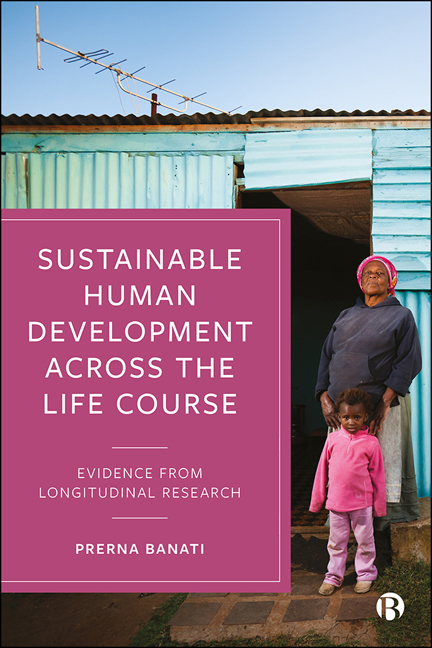Book contents
- Frontmatter
- Dedication
- Dedication
- Contents
- List of Figures, Tables and Boxes
- Notes on Contributors
- Foreword: Understanding and Enhancing Human Development Among Global Youth – On the Unique Value of Developmentally Oriented Longitudinal Research
- Introduction: Measuring Sustainable Human Development Across the Life Course
- 1 Exploring the Potential for Gender Norm Change in Adolescent Girls: Evidence from ‘Real Choices, Real Lives’ Longitudinal, Qualitative Study Data
- 2 Unequal Educational Trajectories: The Case of Ethiopia
- 3 Early Life Transitions Increase the Risk for HIV Infection: Using Latent Class Growth Models to Assess the Effect of Key Life Events on HIV Incidence Among Adolescent Girls in Rural South Africa
- 4 Achieving the Sustainable Development Goals: Evidence from the Longitudinal Parenting Across Cultures Project
- 5 Achieving Gender Equality: Understanding Gender Equality and Health Among Vulnerable Adolescents in the Sustainable Development Goals Era
- 6 Capturing the Complexities of Adolescent Transitions Through a Mixed Methods Longitudinal Research Design
- 7 Child Well-being Across the Life Course: What Do We Know, What Should We Know?
- 8 Mauritian Joint Child Health Project: A Multigenerational Family Study Emerging from a Prospective Birth Cohort Study: Initial Alcohol-related Outcomes in the Offspring Generation
- Conclusion: The Future of Longitudinal Research
- Index
2 - Unequal Educational Trajectories: The Case of Ethiopia
Published online by Cambridge University Press: 05 January 2022
- Frontmatter
- Dedication
- Dedication
- Contents
- List of Figures, Tables and Boxes
- Notes on Contributors
- Foreword: Understanding and Enhancing Human Development Among Global Youth – On the Unique Value of Developmentally Oriented Longitudinal Research
- Introduction: Measuring Sustainable Human Development Across the Life Course
- 1 Exploring the Potential for Gender Norm Change in Adolescent Girls: Evidence from ‘Real Choices, Real Lives’ Longitudinal, Qualitative Study Data
- 2 Unequal Educational Trajectories: The Case of Ethiopia
- 3 Early Life Transitions Increase the Risk for HIV Infection: Using Latent Class Growth Models to Assess the Effect of Key Life Events on HIV Incidence Among Adolescent Girls in Rural South Africa
- 4 Achieving the Sustainable Development Goals: Evidence from the Longitudinal Parenting Across Cultures Project
- 5 Achieving Gender Equality: Understanding Gender Equality and Health Among Vulnerable Adolescents in the Sustainable Development Goals Era
- 6 Capturing the Complexities of Adolescent Transitions Through a Mixed Methods Longitudinal Research Design
- 7 Child Well-being Across the Life Course: What Do We Know, What Should We Know?
- 8 Mauritian Joint Child Health Project: A Multigenerational Family Study Emerging from a Prospective Birth Cohort Study: Initial Alcohol-related Outcomes in the Offspring Generation
- Conclusion: The Future of Longitudinal Research
- Index
Summary
Introduction
Obtaining education is widely acknowledged to constitute one of the main starting conditions for later opportunities over the life course, regarded as a quintessential means to improve productivity, promote a healthy lifestyle, empower and increase civic participation, raise individual capabilities, and reduce intergenerational transmission of poverty (Buchmann and Hannum, 2001; Hanushek and Woessmann, 2008; Sen, 1999). Considerable progress has been made in terms of increasing enrolment rates at a primary and secondary school level all over the world, especially after the World Education Forum in Dakar in 2000 in which the international community committed to achieving Education for All by 2015 (UNESCO, 2017a), and the Millennium Development Summit of 2000 in which the world's leaders committed to meeting the Millennium Development Goals (MDGs), among which was universalization of primary school enrolments and gender parity (UN, 2015). The steepest progress in pupil's enrolments has taken place in sub-Saharan Africa, where primary school enrolment rates between 1990 and 2015 on average increased from 52% to 80% (UN, 2015). One of the most notable increases was observed in Ethiopia, the case study of this chapter, where net primary school enrolments grew from 19% in 1994 to 85% in 2015, and net secondary school enrolments increased from 11% in 1999 to 31% in 2015 (World Bank, 2019).
Despite this progress, recent evidence shows that getting children into school has not translated into knowledge acquisition. According to UNESCO, the latest estimated share of children not achieving minimum proficiency levels in reading and mathematics by the time of primary school completion age in sub-Saharan Africa was about 85% on average (UNESCO UIS, 2017: 7; UNESCO, 2017a). It is becoming more and more evident that children's learning outcomes depend not only on school availability but also on school quality and home environments where learning and decision making about children's educational trajectories take place. Educational outcomes can be highly stratified by family background due to differences in living conditions in early childhood and parental resources during school age. This type of stratification – conventionally called inequality of educational opportunity – can be either equalized or further exacerbated depending on the educational systems and policies in place.
- Type
- Chapter
- Information
- Sustainable Human Development across the Life CourseEvidence from Longitudinal Research, pp. 43 - 68Publisher: Bristol University PressPrint publication year: 2021

